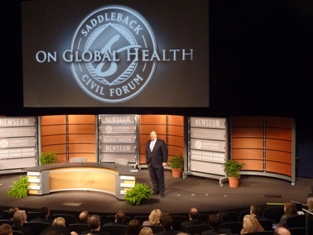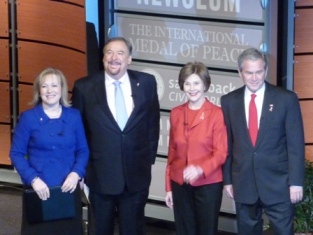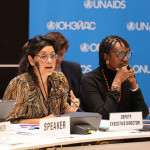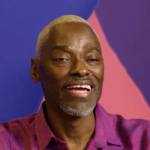December 1st, 2008 was my third World AIDS Day as the editor of POZ. The day is always so bittersweet-it cooks up a cauldron of conflicting emotions for me.
On the one hand, it is a day to pause and recall all those we’ve lost to AIDS and renew our resolve to keep millions of others from joining them in the hereafter. In that sense, it is a day full of grieving and grim determination. It is a day to acknowledge all the hurdles we still must clear: too many people who are living with HIV who don’t know their HIV status, too many people in need of support and treatment who can’t access it, too many children orphaned by the disease, too much stigma, too little comprehensive sex education, too many people behind bars or living homeless on the streets with HIV, the particular vulnerability of African Americans and the Latino community to AIDS, a lack of a federally-sanctioned needle exchange program, wait lists for the AIDS Drug Assistance Program, underfunding of AIDS services relative to the rising need, an increase in the criminalization of people with HIV, AIDS fatigue in the activist sector, setbacks in our quest for vaccines, microbicides and still no cure in sight.
But it is also a day of celebration and joy. On the day of my diagnosis, if you’d told me I’d be around 12 years later to celebrate World AIDS Day, I wouldn’t have believed you. There is much to celebrate. And I am always amazed at the endless energy and relentless commitment of the AIDS community that seems to shine extra bright on World AIDS Day. People with HIV can now live long, full, healthy lives. They can have children without passing HIV onto them. We have drug regimens that are easier to take, and that have more manageable side effects. We have new classes of drugs, and progress in studies exploring whether treatment can render people non sexually infectious and whether treatment can serve as a preventative tool (PrEP). The needle is moving in terms of the public’s acceptance of people living with HIV and their understanding of how HIV is-and isn’t-transmitted. More and more people have come forward to speak of their HIV status, overcoming shame and discrimination. South Africa has a new health minister. And faith based communities around the world are beginning to embrace people living with HIV, seeing the power of their support and as an existing infrastructure to distribute information, support and maybe one day, condoms and treatment.
And perhaps most importantly for the domestic AIDS crisis in America, we have a President Elect who speaks openly with conviction about his determination to develop and implement a National AIDS Strategy for the United States.
See President Elect Barack Obama’s message on World AIDS Day here:
This year, for World AIDS Day, I headed south of the Mason Dixon to Washington, D.C. to have dinner sunday night with Frank Oldham, CEO of the National Association of People Living with AIDS. We caught up and hypothesized about who may be chosen as President Elect Barack Obama’s AIDS Czar. Just the fact that we will again have a federal governmental department responsible for addressing domestic AIDS offers so much hope for change on the front lines of AIDS in America. We also raised our margarita glasses to those we’ve lost to the virus.
Monday morning, after a sleepless night at the Hotel Rouge on Embassy Row (there had been a chance I’d meet President Bush and I was agonizing over what I’d say to him if I had the chance), I headed over to the Newseum for the Saddleback Civil Forum on Global Health. (Yes, Saddleback as in Rick Warren’s Saddleback Church.) Pastor Rick Warren (author of “A Purpose Driven Life”) was presenting President George W. Bush with the first International Medal of PEACE from the Global PEACE Coalition in recognition of President Bush’s contribution to the fight against HIV/AIDS. The medal is given for outstanding efforts towards alleviating the five global “giants” recognized by the coalition including: “pandemic disease, extreme poverty, illiteracy, self-centered leadership and spiritual emptiness.”
The Global PEACE coalition is a web of churches, businesses and individuals working in unison to solve global humanitarian issues through their “PEACE Plan”-an effort to mobilize one billion Christians to: “P” (promote reconciliation), “E” (equip servant leaders), “A” (assist the poor), “C” (care for the sick) and “E” (educate the next generation).
Pastor Warren gave the medal to President Bush for his President’s Emergency Plan for AIDS Relief (or PEPFAR) program. Despite the caveats that restrict how the PEPFAR funding can be applied (it doesn’t fund needle exchange and supports sex workers only if they sign a pledge stating, basically, that they don’t believe in sex work) the program has saved millions of lives around the world. Since 2003, it’s provided $18.8 billion to fight global AIDS and Congress has recently authorized an additional $48 billion to apply to future efforts to combat AIDS, TB and malaria.
Rick said, “As my wife Kay and I have been implementing the PEACE plan in 68 developing countries, we have seen firsthand many of the hundreds of thousands of lives that have been saved through PEPFAR and the President’s Malaria Initiative. I hope this Forum will show the American people that our global health programs represent more than compassionate humanitarian efforts, but are also a strong, prudent pillar of American foreign policy.”
We could use a little help on the foreign policy platform, no doubt about that.
Having traveled myself to the Pacific Rim and Africa in the last year, I have to say, there is no doubt that PEPFAR dollars are working and that the people whose lives they say are obviously extremely grateful. There’s no question that the rules of how PEPFAR is applied need revision, and hopefully Obama will do that. There’s no question that we need higher levels of spending on domestic AIDS, and hopefully Obama will ensure that as well. But President Bush and his administration do deserve a lot of credit for PEPFAR.
It was fascinating to see President Bush, who was joined onstage by First Lady Laura Bush, speak candidly about his AIDS work. Even to have the opportunity to see him talk for nearly an hour not through the prism of the media was worth the 7 hours it took to get through the Sunday night post-Thanksgiving traffic. He was quite funny, and self-effacing. He is obviously very proud of his wife, who is a lovely, smart and seemingly very compassionate woman. When asked to recall one of his favorite moments of seeing PEPFAR’s impact, President Bush remembered being in Africa and being greeted by a throng of children who “were waving at the Americans with more than one finger.”
He spoke of the importance, from both the perspectives of foreign policy and national security, of helping the rest of the world fight disease. And he spoke of the necessity of helping the world’s orphans. Kay Warren poised some rather pointed questions to the President regarding his attention to the domestic AIDS crisis. He replied, “PEPFAR is part of a comprehensive strategy to deal with AIDS at home and abroad. PEPFAR was never intended to pirate money from domestic funding. [The funding levels for AIDS in America] should give a sense of our commitment. To date, we’ve spent 99 billion dollars on AIDS in America and funding has increased 40 percent since 2001.” I wanted to raise my hand and mention that while that may be true, we still have people dying on AIDS Drug Assistance Programs and that it is my belief that part of the reason people are afraid to come forward and get tested for HIV is because they know they can not afford treatment or care and who wants to be told they have a deadly disease for which there is treatment but that they will die from it because they don’t have the money to save their lives, but it wasn’t the forum for that. The President continued, “People in America should not think that PEPFAR means we don’t care about them.”
I don’t know whether or not that’s true, but it doesn’t undermine PEPFAR’s impact on AIDS in general or in terms of what it has done to help the rest of the world see that America can indeed be benevolent. And, regardless of the motives behind the program, it has spread a huge swath of healing through parts of the world that you have to see with your own eyes to believe the dimensions of the horrors that exist there. To me, not a penny should be taken from this amazing program. That said, we need to find additional funds for AIDS at home too. It is unthinkable to me that Americans are dying of AIDS In 2008 and that the rate of infection in the District of Columbia is 1-in-20--a rate that rivals that of some sub-Saharan countries and could, arguably, qualify the District itself for funding under PEPFAR.
Rick Warren spoke about using the church to help end the AIDS pandemic. He showed a slide of Western Rwanda. On it were three blue “Hs” indicating the three existing hospitals. He said it was a two day walk, one way, to get to a hospital. The next slide showed about 20 “Xs” marking the locations of the health clinics. It was a one day walk to a health clinic. The third slide showed the 728 churches that exist in that part of Rwanda--it was a ten minute walk for most people to their church. Regardless of attitudes about any particular faith-based organization, or the specifics of what they believe or preach, there is no doubt that organized religion does indeed offer a system that could be used to distribute information and possibly, one day, treatment, counseling and condoms. It is an interesting idea: rather than spend time and money building and staffing clinics, why not employ the help of local religious leaders? (As long as they are willing to talk turkey and acknowledge that people have sex and do drugs and are willing to talk openly about how to do those things safely.) Imagine people in developing nations going to a service at a house of worship of their choice and getting a polio vaccine, a treated mosquito net to ward off malaria, a TB vaccine and information about safe sex, condoms or an AIDS test and, if they are HIV positive, treatment?
Rick Warren said, “Some problems are so big you have to ’team tackle’ them. The combination of public and private partnership is a two-legged stool. For stability, you need three legs. You need for-profit organizations, non-profit organizations and the faith-based community. Most of the world has some kind of faith. [Given the way people trust their spiritual leaders] the church brings things [to the fight against AIDS] that government and business can’t. 2.3 billion people worldwide claim to be a member of some kind of church. I could take you to 10 million villages in the world and all they have is a church. The church speaks more languages and is in more nations than the United Nations. People of good will of all faiths-or no faith-have to work together or we will never be able to eradicate AIDS.”
The was a series of video congrats from Prime Minister Tony Blair, President Kagame from Rwanda (representing all African presidents), Bill and Melinda Gates, Michel Kazatchkine, UN Secretary-General Ban Ki-Moon, Bono and President Elect Barack Obama. I have to say, I got a chill when Bono, who refered to himself as a “friendly neighborhood rock star” said that “3 million people owe their lives to the United States...it’s a day to give thanks. God Bless America.” Bill and Melinda Gates spoke of the necessity to keep investing in the fight against AIDS saying, “Having made so much progress, it’s no time to turn back.” Obama said, “I salute President Bush for his leadership in crafting a plan for AIDS relief in Africa and backing it up with funding dedicated to saving lives and stopping the spread of the disease. In my administration, we will continue this critical work to address the crisis around the world. But we must also recommit ourselves to addressing the AIDS epidemic here in the United States with a strong national strategy of education, prevention and treatment focusing on those communities at greatest risk. This strategy must be based on the best available science and built on the foundation of a strong healthcare system. In the end, the epidemic can not be stopped by government alone and money alone is not the answer either. All of us must do our part. This year’s slogan, ”Stop AIDS, Keep the Promise,“ is a timely one. In the Apostle Paul’s letter to the Corinthians, he asked,’”If the trumpet does not sound a clear call, who will get ready for battle?’ We as leaders must continue to sound that call and encourage others to see themselves as leaders in this fight."
Here are two photos from the program:


After the forum, I joined the Warrens and a crew of other people from the AIDS world to chat with Rick about recommendations he could make to Obama and his new administration. It was so encouraging to see a very diverse and very determined group of people coming together despite ideological differences and differences in their missions to try to collaborate on a strategy to better combat AIDS in America.
Then, I hopped in my car and drove like a madwoman back to New York City to rejoin the POZ staff on Broadway. We hosted a Broadway show of top performers singing Burt Bacharach songs to benefit Broadway Cares/Equity Fights AIDS. The house was full and the singing robust and inspiring. World AIDS Day ended with a standing ovation under a sea of floating bubbles and a stage full of people singing, “What the world needs now, is love, sweet love” and “That’s what friends are for.”
Indeed.








Comments
Comments